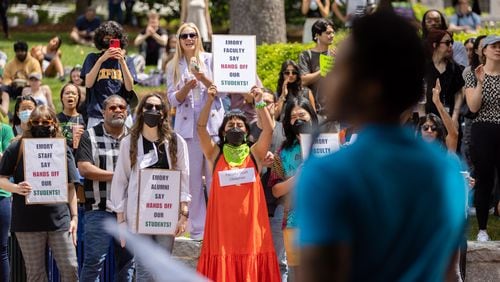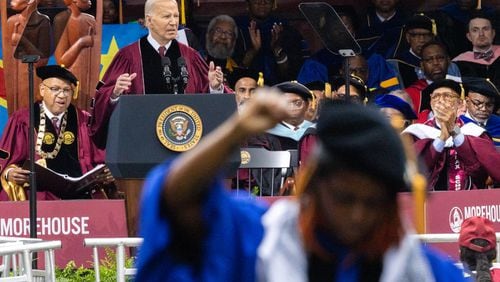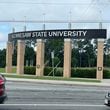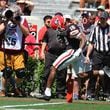As proud Emory University alumnae, women who shared engaging years together as undergraduates in the early to mid-1980s, we are deeply concerned with President Gregory Fenves’ decision to call on law enforcement to respond to campus protests on April 25. Allowing Georgia State Patrol and Atlanta Police Department officers to march onto the quad, carrying long guns and using tasers, batons and militarized equipment to threaten and arrest students and faculty members was beyond disturbing. It betrayed the principles of an open university, one that fosters learning, discussion and debate and that works for social justice. We urge Fenves to take immediate steps to regain trust.
Each of us values deeply the formative years we spent in Emory’s classrooms and on the quad, engrossed in conversations, learning to think critically, challenge and explore in our academic work and through community engagement. Most of us were active in the political movements of the times, including divestment from South Africa, anti-CIA engagement in Nicaragua and anti-nuclear protests. Today, we live our own lives in different locales. We are advocates, artists, farmers, lawyers, musicians, physicians, professors, teachers, therapists and community leaders in Georgia, Connecticut, Illinois, Colorado, California, Maryland and Trinidad and Tobago. We are parents and aunts, with college-age and young adults held closely in our hearts. Though it’s fair to say that we have different perspectives on the Israeli-Palestinian conflict, we reject unequivocally antisemitism and human rights violations wherever they occur. And though we are not naive about the challenges facing all university leaders at this time, we also agree that the administrative decision to call in the state and city police after less than three hours of student protest was wrong, dangerous and harmful.
If we are not supporting young people in their exercise of our core ideals, including freedom of speech and expression of different viewpoints, we not only shatter trust, but we also put our community members at risk. Across the decades, it is surely evident that calling law enforcement onto campus is far more likely to result in escalation and increased physical danger than in “keeping the peace.” Inviting armed police into a campus protest environment, even a volatile one, creates unacceptable risks for all students, staff and faculty, especially for people of color who have long been treated unequally and subjected to inappropriate and excessive force by police. Indeed, physical injury was one of the costs borne by student protesters and members of Emory’s faculty who merely sought to assist students in distress.
We urge President Fenves to study, publicize and adopt key principles laid out recently in the ACLU’s Open Letter to College and University Presidents on Student Protests. These include:
1. Universities should not single out a particular viewpoint for censorship, discipline or disproportionate punishment.
2. Universities can and should protect students from discriminatory harassment on the basis of race or national origin. Both anti-Palestinian and antisemitic speech targeted at individuals because of their ethnicity or national origin constitutes invidious discrimination and cannot be tolerated. But expressing impassioned views is not discrimination and should be protected.
3. Universities can announce and enforce content-neutral, reasonable time, place, or manner restrictions on protest activity.
4. University leaders should involve police only as a last resort.
5. Universities must resist political pressures exerted by politicians seeking to exploit campus tensions to advance their own agendas, as some Georgia politicians did.
Though our nation has often fallen short, American ideals of freedom of speech, democracy and justice for all are the heart of our country. We want today’s students to be able to depend on these essential tenets of our Constitution, as we did in the 1980s. By encouraging debate, allowing dissent and tolerating even the most profound differences of opinion, Emory prepares the future leaders of our pluralistic society. And even when campus protests are difficult and tense, the Supreme Court has forcefully rejected the premise that, “because of the acknowledged need for order, First Amendment protections should apply with less force on college campuses than in the community at large.” To the contrary, the court has stated, “the vigilant protection of constitutional freedoms is nowhere more vital than in the community of American schools.”
The writers are graduates of Emory University.






